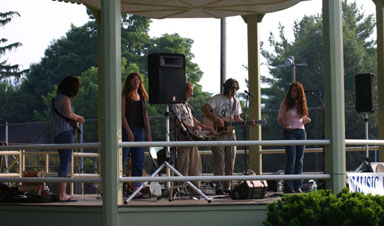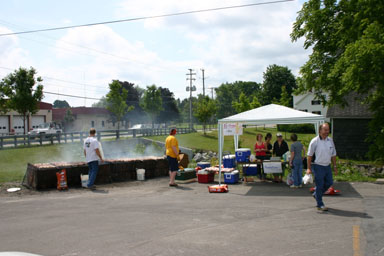July 1, 2004
TC3 awards tech funds
This morning's Ithaca Journal reports that Tompkins-Cortland Community College has awarded $45,000 in technology funds to local schools, including a Civil Engineering and Architecture Community Collaboration project at Dryden High School.
The Journal also has a cheerful picture from the Dryden Summer Skies Program.
In more challenging news, legislation to reorganize TCAT is in limbo, and County Highway Division Manager Peter Messmer has resigned.
The SPCA will be hosting its Dog Day Walk-a-thon on Saturday, July 10th, from 10am to 3pm.
Mark Rust gets people dancing
Montgomery Park had music and dancing last night as a couple of hundred people turned out to see Mark Rust and dance. In the first of a series of eight Wednesday night concerts sponsored by the Town of Dryden Recreation Department, Rust taught steps to a crowd of dancers by the bandstand.

Mark Rust (clapping near bandstand) gets a crowd dancing a Virginia Reel.
The next concert will be Wednesday, July 7th at 6:30pm, with the Burns Sisters performing. (I've posted the concert schedule (165KB PDF), and copies are available at Town Hall.)
Dryden Courier on goodbyes, concerts
This week's edition of the Dryden Courier reports on Dryden school graduations and retirements, along with end-of-year awards. They also have a piece on the concert series the town is sponsoring in Montgomery Park on Wednesday nights.
Inside the paper are announcements of winners at Dryden Dairy Day and fund-raising for Supplies for Success, providing school supplies to children in need in the Dryden area.
In the opinion section, 96-year-old former Dryden resident A. K. Fletcher writes about keeping Camp Barton (the Boy Scout camp on Cayuga Lake) going, and there's a good-bye letter from Nathan Winograd, who is leaving the Tompkins County SPCA on Hanshaw Road this summer.
July 2, 2004
Remembering a Freeville resident
Today's Ithaca Journal is quiet on Dryden, except for Roger DuPuis' remembrance of former colleague and Freeville resident Jarrett McLaughlin, who died in a car accident in Newfield on June 30th.
Planning Board subdivision approvals
The Town of Dryden Planning Board gathered Wednesday night and held public hearings on and gave approvals to two subdivision proposals in Etna. Phase I of the Daniel Armitage subdivision, lots A, B, C, and D on the map (134KB PDF), at the intersection of Sheldon and Wood Roads, received final approval, while Phase II, lots G-1, G-2, and G-3 at the intersection of Wood and Etna Roads, received preliminary approval. (Lots E and F are large enough that they don't need approval.)
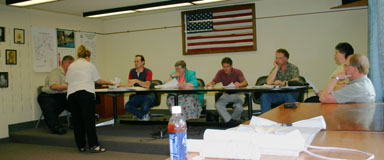
Joan Portzline distributes survey maps of the Daniel Armitage subdivision.
The board discussed questions of road cuts, preferring that the driveway for Parcel A cut into Sheldon Road rather than Wood road, but didn't put stipulations on purchasers.
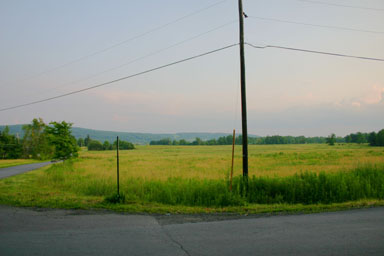
Land involved in Phase I of the Daniel Armitage subdivision.
The final public hearing for the Phase II subdivision will be at the next Planning Board meeting, on July 15th.

Land involved in Phase II of the Daniel Armitage subdivision.
(Both hearings were rescheduled from the previous meeting, which had a lot of discussion of agriculture issues but no quorum.)
July 3, 2004
TCAT dart, calendar laurel
Today's Ithaca Journal is quiet on Dryden news, but Laurels & Darts includes a dart from Dorothy Manley of Etna to TCAT for bus stop changes in downtown Ithaca. There's also a laurel from the Tompkins County Solid Waste Management Division to people who donated old calendars, which were used at the Dryden Science Fair (as well as the Earth Day celebration in Dewitt Park and the Ithaca Festival) for crafts.
Looking beyond Dryden, the Journal has extensive coverage of negotiations between the county and the state over the size of a new jail, including a timeline and an article on the variables that go into determining jail populations. There's also a partial explanation of the county's emergency radio problems tied to disruption of a line by construction work in downtown Ithaca.
July 4, 2004
Up the hill toward Cornell
Continuing west from the houses east of Forest Home Road, the road slopes up substantially. On the south side, a Lifestyle Properties complex, Eastgate Apartments, is set into the hill, while on the north side a group of houses appears at the crest of the hill.
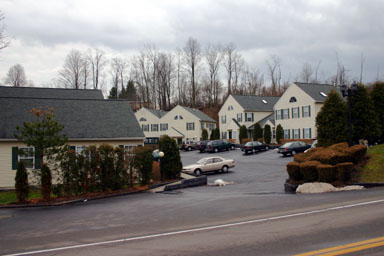
847 Dryden Road, Eastgate Apartments (map)

836 Dryden Road (map)

832 Dryden Road (map)

828 Dryden Road (map)
Updated August 11th, 2004: I'd left out 832.
Dryden from 1812 to 1822
I suspect I'd be irate if I had to go to Albany because my credit for buying nails here was no good, and Albany is far easier to get to today than it was in 1816. In this installment, George Goodrich examines the first known printed description of Dryden, formation of school districts, the question of which county would contain Dryden, and census figures that had Dryden peaking in 1835 at 5851 before declining to 3912 in 1897. (The 2000 figure was 13,352.)
Chapter XI.
Events from 1812 to 1822.
In the year 1813 there was published at Albany the first edition of "Spafford's N. Y. State Gazetteer," which contains the early description of the town of Dryden which we have found, and probably the first ever printed, which we therefore reproduce here in full as follows:
"DRYDEN - A post-township in the southeastern extremity of Cayuga county, 35 miles S. of Auburn, 170 west of Albany; bounded N. by Locke, E. by Virgil in Cortlandt county, S. by Tioga county, W. by Seneca county [which then included Ithaca] and the town of Geneva [Genoa (?) the part now Lansing.]
"It is 10 miles square, being one of the military townships, and has a considerable diversity of surface, soil and timber.
"Fall Creek of Cayuga Lake with several branches spreads over the northern and central parts, and Six Mile creek, a fine mill stream, rises in the S. E. corner, runs into Tioga county and returns across the S. W. towards the head of Cayuga Lake. There is also another small stream, and there is an abundance of mill seats with considerable tracts of alluvion; though the general character is hilly with pretty lofty ridges. The soil of the alluvion is warm, rich and productive; that of the uplands rather wet and cold, but excellent for pasture and meadow. There are two grain mills and carding machines. There are some congregations of Baptists and Presbyterians who have houses of worship, but I am not informed of their number; and 4 or 5 school houses. The settlements were commenced about 1800, and in 1810 the population amounted to 1890, when there were 310 families and 213 senatorial electors. The whole taxable property, as assessed in 1810, $84,099. There are 3 turnpike roads that cross this town, besides common roads in various directions. The inhabitants are principally farmers whose farms and looms supply much of their common clothing. - N. T. R. P."
In the year 1814 at a special town meeting a board of town school superintendents was first elected, consisting of Joshua Phillips, Peleg Ellis and John Ellis. Afterwards in the same year they met and divided the town into fourteen school districts, which have since been increased to twenty-seven. The amount of public school money disbursed by this board to all the districts in 1814 was $192.47, not one quarter of the amount now annually received by the Dryden village district alone. In no department of public affairs has there been such a marked and continual improvement as in the matter of education in the common schools. Our young people should realize that in school opportunities they have a great advantage over the school children of even twenty-five years ago, while their privileges in this respect are not to be compared with the very meager opportunities which were offered for school education in the Pioneer Period of Dryden's history.
The year 1816 was known as the "cold season," in which nearly all of the crops were destroyed by summer frosts, and great scarcity, almost a famine, resulted. It should be borne in mind that there were no such means of transportation then as now to relieve a section where the crops had failed, and no great supply of produce was carried over from year to year.
In this year, 1816, Elias W. Cady moved in from Columbia county and located on the farm near Willow Glen which he owned and occupied for more than sixty years, becoming one of the most prosperous farmers of the town. He was a member of the State Legislature in 1850 and 1857, and his grandson, John E. Cady, has in recent years twice held the same position. Elias W. Cady in his later years used to delight to tell how, when he first came to Dryden, Parley Whitmore, who kept a store in Dryden village near where the M. E. church now stands, refused to trust him for a few pounds of nails and he was obliged to take a load of produce to Albany to get them.
In the next year, 1817, the new county of Tompkins was formed, and Dryden became a part of it, instead of being the southeast corner of Cayuga county. Cortlandt county (so spelled in those days) had been formed in 1808 and an unsuccessful effort was made in the Legislature in the same year, supported by petitions from some of Dryden's citizens, to make this town a part of it.
A state census made in 1808 shows that the number of electors at that time in the town of Dryden whose farms exceeded in value £100 (about $500) each, was seventy-four; two others had farms exceeding in value £20, while the number of electors who rented tenements of the yearly value of forty shillings was returned at 174. The census of 1810 having shown a population in the town of 1890, that of 1814 shows an increase to 2545, while that of 1820 returns a population of 3995, showing a very rapid increase and reaching, near the end of the first quarter of the Century Period, a number slightly exceeding that of the present population, the highest number ever reached being 5851 returned in 1835, while the latest returns, according to the census of 1892 after the loss of seven lots in 1888, show a present population of 3912. The causes which have influenced this sudden increase and afterwards the gradual decrease of our population will be treated of in a separate chapter hereafter.
Goodrich, George B. The Centennial History of the Town of Dryden, 1797-1897. Dryden: Dryden Herald Steam Printing House, 1898. Reprinted 1993 by the Dryden Historical Society. Pages 33-35.
(The Dryden Historical Society, which sells this book, may be reached at 607-844-9209.)
July 5, 2004
Blood drives July 21st and 24th
It's another quiet day for Dryden news. The only mention of Dryden in the Ithaca Journal is in a listing of Red Cross blood drive locations. There are two drives in the Town of Dryden, one at the Dryden Veterans Memorial Home on July 21st from 1pm to 6pm, and one at Bethel Grove Bible Church on July 24th from 8am to 1pm.
How castle-like is your home?
I don't mean how many turrets your house has, or if it has stone walls. I'm asking about the isolation level of many of the places people live - my own included. In doing petitions last week, I visited a lot more houses that I'd never seen from the road. Some houses are on side streets, and some are down long driveways. A number of them were beautiful islands, reachable only with a lot of effort.
My own house is on a lot that feels oversize every time I mow it - about three-quarters of an acre - and my neighbors have similar or larger lots. Behind me is forty acres of empty woods before the next house, and across 366 is Cornell nature preserve. Apart from 366 itself, the house is pretty isolated, and 366 isn't a road that encourages you to meet your neighbors. The road's noises regularly intrude on the property as well, making it clear that my castle walls are hardly a defense against gravel and concrete trucks, motorcycles, or thudding stereos.
While some houses in Dryden share this combination of isolation from neighbors and intrusions from noise, a lot of them of them have one or the other or neither. The villages in particular have quiet side streets where houses are close enough to each other that they form a neighborhood, not just a line of buildings. The interiors of the houses may still be pleasantly isolated castles for their inhabitants, but the clusters of castles are dense enough to mellow their interior isolation.
Remaining June meeting issues
It doesn't look like I'm going to have time to write up the rest of the June Town Board meeting the way I'd like to, and the town's minutes are already available, so I'm just going to talk a bit about the meeting beyond the infrastructure and recreation issues I've already covered.
If you've been curious about the construction at the Marrotte site on 13, formerly L and A Auto, the board approved an application for a two-bay garage to be put there for auto detailing.
The board also heard from Jennifer Eames representing AFLAC about the prospect of disability and other benefits for town employees. The employees would pay the (pre-tax) premiums, but the town would manage paycheck deductions and have a reduced FICA tax bill as well. The board suggested setting up a meeting to see if employees were interested.
The most troubling part of the meeting, for me, anyway, was the continuation of the septic problems at 483 Hunt Hill Road. The town became involved when the county asked Dryden Zoning Officer Henry Slater to close the premises down, which Slater did, only to find someone else living in a trailer on the site later. Councilman Chris Michaels, who had pushed hard at the previous meeting for Town Attorney Mahlon Perkins to take action supporting Slater's order, now supports Perkins' opinion (based on the County charter and other applicable law) that it's a problem for the county to solve. Environmental Planner Debbie Gross did offer them data on waterflows through their area, and County Legislator Martha Robertson had some suggestions as well, but the conclusion seemed to be that it's not an issue for the town.
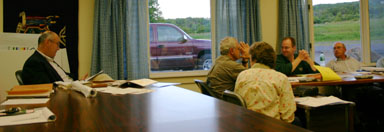
Town Attorney Mahlon Perkins talks to the Town Board
Legally, I suspect that they're correct. This particular property is snarled in an unfinished will probate and a disputed land contract as well, which makes it very easy for everyone involved to point to someone else and say that it's someone else's problem. Given Dryden's many watersheds and many septic systems, it seems dangerous to let these kinds of issues rest in limbo. I don't know if changes are necessary at the state or the county level, but I'd like to see a better roadmap of how this works and perhaps active support from the town as a first responder. The town manages sewer systems and is busy with aquifer studies, but its hands appear to be tied when it comes to septic systems.
There was also some discussion of the other dispute among neighbors at the May meeting, the proposal by Nick Bellisario to build a self-storage facility on Oak Brook Drive. Councilman Michaels said he'd heard and investigated chainsaws and trucks running at the property under consideration. Zoning Officer Slater said that Bellisario had reported the work was being done elsewhere on his property, but Michaels asked for a history of work that had been done and was being done.
The Board discussed HUD loans that apparently hadn't been paid last year, in a period where the books for the town were not in order, and decided to ask for payment. They also designated polling places for 2004 and approved changes to the budget. The board postponed consideration of a payment request from the Ellis Hollow Community Center on grounds that their web site describes the center as for use of Ellis Hollow residents only. There weren't a lot of details, and presumably it will be addressed at a later meeting. They also appointed Molly Riley to the Recreation Commission.
According to the minutes, the board took no action during executive session regarding the acquisition of a piece of property, most likely the golf course.
Town meetings in July
The Town of Dryden has updated their public notices page for July.
- The Zoning Board of Appeals meets tomorrow, Tuesday, July 6th, at 7:30 pm.
- The Recreation Commission is meeting on Monday, July 12th at 6:00 pm, at the Recreation Department Office (map). Use the back entrance.
- The Conservation Board is meeting Tuesday, July 13th, at 7:30 pm. (They're still looking for two new members.)
- The Town Board is meeting at 7:00pm on Thursday, July 8th and Thursday, July 22nd. The full agenda for the first meeting is posted, and the second meeting includes four public hearings.
- The Youth Commission is meeting at 7:00 pm on Tuesday, July 20th.
- The Planning Board's July meeting isn't listed, but they sounded like they would be meeting at 7:00 pm on Thursday, July 15th. (They had an additional meeting last week.)
Unless otherwise noted, all meetings listed here are at the Dryden Town Hall (map).
July 6, 2004
State police promotions, SPCA, hazards
This morning's Ithaca Journal reports that the Dryden state police barracks has a new commander. Major Thomas P. Kelly, Jr. the previous commander of Troop C, has been promoted to staff inspector at the State Police Division of Internal Affairs Bureau. Major Louis G. Barbaria Jr., who previously commanded Troop F, replaces him. (Troop C covers Tompkins, Tioga, Otsego, Delaware, Cortland, Chenango, and Broome counties.)
There's another notice for the SPCA's annual Dog Day Walk-A-Thon, which will be July 10th from 10am to 3pm at the SPCA's new building on Hanshaw Road.
The Journal also notes that Tompkins County is hosting a meeting Wednesday, July 7th, to discuss a Multi-Jurisdictional Hazard Mitigation Plan that includes the County and most towns except Dryden, but the Planning Process Overview document (141KB Word document) indicates that the Town of Dryden "has already completed its hazard mitigation plan". (Newfield and the City of Ithaca have their own plans in progress.)
Addressing an issue just west of Dryden, Trumansburg resident Patricia Bonsall writes about the dangers of the Brown Road - Route 13 intersection and her effort to get a traffic light there.
Democratic caucus next Tuesday in Etna
The Town of Dryden Democrats will be caucusing at Houtz Hall (map), 2 Lower Creek Road, Etna, at 7:30pm on July 13th to choose a candidate for Town Judge. The incumbent is a Democrat, Joseph Valentinelli. (Christopher Clauson, a Republican, is the other Town Judge, but is not up for election this year.)
After the caucus we'll be having a meeting to discuss upcoming campaign events. All registered Democrats are welcome to attend. Also, if you'd like to buy a Kerry sign, I'll have a stack of them there.
Low-carb kitchen cabinets
If I had a big sign on the highway, I'd probably come up with some interesting messages too. The folks at Locke Woods Interiors on the 13/366 overlap have a new sales pitch for the world to consider.
July 7, 2004
Nature preserve, Supplies for Success
This week's Our Towns section in the Ithaca Journal takes a look at the creation of the O.D. von Engeln Preserve in Malloryville, which hosts pitcher plants, carnivorous sundews, and native orchids. Its two miles of trails are attracting a "steady stream" of visitors.
In this week's Dryden Town Talk, Cathy Wakeman talks about Adam Pamel's Eagle Scout project, the "Supplies for Success" program which is collecting school supplies and cash for supplies for K-2 students who need them. She also discusses beautification in the Village of Dryden and the summer "Music in the Park" concert series. The Burns Sisters are playing tonight at Montgomery Park in the Village of Dryden.
Dryden briefs report that the First National Bank of Dryden's Cortland office is now open, and that the Dryden High School Class of '84 will be having a reunion July 9th and 10th.
For some reason, the paper has repeated last week's statistical sidebar, which still announces that 49.94% of Dryden residents are male while 50.06% are female.
At the county level, the Legislature passed five resolutions for moving forward with a new emergency communications radio tower on Ithaca College property.
Finally, if you see helicopters overhead, they may be inspecting power lines for NYSEG.
July 8, 2004
Supervisor Trumbull on golf course
This morning's Ithaca Journal includes a letter from Dryden Town Supervisor Steve Trumbull about the Lakeview Golf Course. It doesn't say that the town is buying the course. Instead,
"We want to dispel the notion that the town board is blocking private enterprise in order for the town to take over the course. Rather, the board wants to encourage those interested in the golf course to review the report and discuss their ideas with us. We have made a commitment to work with any potential new owner in order to protect the Dryden community's interest in maintaining this valuable open space and environmental resource."
This doesn't sound to me like the board is planning to buy the course. It sounds rather like the board is hoping that whoever does buy the course will be interested in maintaining it as a course, using the report as a basis. An amenable buyer would avoid the problem Councilman Michaels brought up at the March Town Board meeting that he was "very resistant to keeping someone who paid cold hard cash for it from building houses on it." The letter also includes some specific ideas for town involvement:
"While continuing private ownership of the golf course, we also hope to expand recreational opportunities that the area would offer, in addition to golf. Possibilities include the town purchasing an easement along the lake's edge to continue the Jim Schug Trail and perhaps use the golf course for cross-country skiing."
Elsewhere in the paper are a notice that TC3 is offering lifeguarding courses, a piece on the Town of Ithaca's dealing with the Recreation Partnership (something that Dryden is also addressing), and a list of local college graduates.
Intergenerational Band, Fish tales
This week's Dryden Courier takes a look at the Dryden Intergenerational Summer Band and Chorus, which formed to help Dryden celebrate its 1997 bicentennial but "discovered they were having too much fun to disband". They'll be performing August 14th at 7pm at Groton High School and August 15th at 3pm at Dryden High School.
They also take a look the Kids All-American Fishing Derby, which will be held at Dryden Lake July 15th from 9am to noon. The article leads off with tall tales from Town Supervisor Steve Trumbull, Town Councilman Christopher Michaels, and County Legislator Mike Lane, and includes fishing tips.
The paper also covers Tompkins County Trust Company's awarding the Raymond Van Houtte Teacher Award to Paula Thoma of Cassavant and Freeville elementary schools, and the awards TC3's Tech Prep program has given to local school districts.
On the opinion page, Lorrie Fitzgibbons of Freeville questions the incoming Dryden superintendent's pay package while Gabriel and Penelope Carpenter of Dryden contend that "Same-sex unions would be a detriment to our civilization, our families, our children and our future."
The Burns Sisters perform at Montgomery Park
I didn't get to stay for the whole thing, and apparently rain eventually interrupted the fun, but The Burns Sisters got a warm welcome last night.

The crowd for The Burns Sisters.
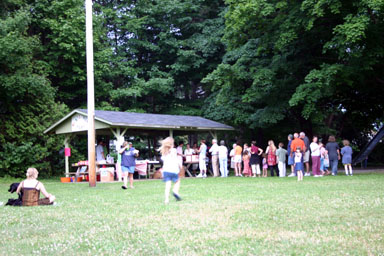
Long line at the concession stand.
The next concert will be Wednesday, July 14th at 6:30pm, with Steve Southworth and the Rockabilly Rays performing. I've posted the concert schedule (165KB PDF), and copies are available at Town Hall.
July 9, 2004
Highlights of the first July Town Board meeting
I'll be writing this up in more detail, but here are some quick highlights from last night's Town Board meeting:
- The board decided to appeal a FEMA decision to halt payment on $170,000 of grants for work on Virgil Creek. FEMA claims the scope of the project grew beyond the grant, while the town believes the changes that were made to the plan were required to stay in compliance with the terms of the grant. (They also reduced the cost of work rather than increasing it.)
- The sale of the Lakeview Golf Course has been postponed, perhaps until after Labor Day, and there are other buyers looking at it. That seems to be what drove Supervisor Trumbull's public letter yesterday.
- There was general support for the Length of Service Awards Program (LOSAP) for volunteer firefighters, though concern about points systems and the potential $250,000 cost of a five-year buyback plan for firefighters already serving.
- While no action was taken on highway matters - Highway Superintendent Jack Bush is on vacation - the draft plans for Hunt Hill Road are now complete. The next step will be sharing them with the public.
- A cell phone tower near the NYSEG building was approved after a three-year process.
- Councilman Mike Hattery expressed his concerns about the Town Board needing to coordinate with the Planning Board on the Draft Comprehensive Plan and with the ITCTC on a possible park-and-ride near the intersection of Routes 13 and 366.
- Summer concerts are going well, with 200 people at the Mark Rust concert last week and 500 at The Burns Sisters concert this Wednesday before a thunderstorm dampened the festivities.
- The Board set up a public hearing for the Royal Road water and sewer district.
I'll have more detail on all of those in the weeks to come. The next board meeting is on July 22nd at the Dryden Town Hall (map), and will be largely filled with public hearings.
FEMA dispute; 4-H Youth Fair
Today's Ithaca Journal looks at last night's Dryden Town Board meeting, notably reporting on the $170,000 dispute with FEMA and the service award program for firefighters.
The Journal also notes the 4-H Youth Fair, which will be held July 28th to 31st at 4-H acres (map).
Elsewhere in the paper, a Dryden resident was arrested for a parole violation and Dryden resident Murray Cohen asks "Democracy everywhere would be very nice, but what is its price?"
July 10, 2004
Volunteer fire companies, jail, laurels
Today's Ithaca Journal has a strong focus on volunteer firefighting, with a piece on families volunteering and the difficulties of recruiting volunteers, the latter of which quotes Dryden Chief Ron Flynn about the sign in front of the Neptune station.
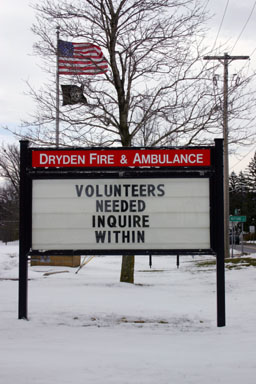
Neptune Hose Company needs volunteers
There's also a piece on options for the Tompkins County Jail that quotes County Legislator Martha Robertson.
Darts & Laurels has two laurels and a dart from Dryden residents, as well as a laurel from a Dryden organization:
- Sharon Warner of Dryden sends a dart to the Ithaca Journal because "bad behavior got huge press... Pity the paper cannot reinforce the kinds of behavior we ask our teens to exhibit rather than support those whose lives are pitiable."
- Rachel Dickinson, president of the Dryden Board of Education, sends a laurel to voters for passing the budget last month.
- Kathy Zahler of Dryden sends a laurel to Karen Lembo, writer of a letter last week that objected to "Bush Must Go" signs and complaining that she hadn't seen any John Kerry signs. As Zahler points out, the Dryden Democrats have those signs, and you can call me at 256-5334 about getting one.
- The American Red Cross, Mike Raffe, Lauren Signer, and the Varna Community Association send a laurel to blood donors at their June 25th event.
There's also a guest column by Nathan Winograd, outgoing director of the Tompkins County SPCA, on spreading the no-kill approach they use on Hanshaw Road to other shelters.
Update: Hrmmph. Darts & Laurels also included a complaint from a couple in Trumansburg complaining about sign theft. My signs out front disappeared sometime yesterday. Their sign was a Bush-Cheney, while my two were Kerry, but sign-stealing seems unfortunately to be popular this year. I just replaced my two.
livingindryden.org
I'm starting to move this site from http://simonstl.com/dryden/ to https://livingindryden.org/. I don't expect anything to break, and both addresses will still work as usual, but if you see any problems, please let me know.
Busy day for fund-raising in Dryden
It was a busy day for fundraising in the Village of Dryden this morning. At the Neptune Hose Company, Adam Pamel was working on his Eagle Scout project, Supplies for Success (51KB PDF), using a car wash to raise money to "supply needy children in grades K-2 with basic school supplies that they can not afford."

Scouts washing cars at Neptune Hose Company.
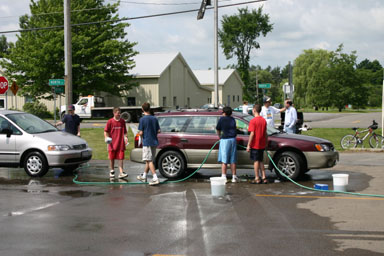
Washing cars and grilling hot dogs for Supplies for Success.
Across the street at Clark's, Covenant Love Community was barbecuing chicken as a fundraiser for their Foundations ministry.
July 11, 2004
Updates in The Shopper
I've been a bit more lax about covering The Shopper, but there's been less in it lately that I haven't covered elsewhere. I do scour it every week, though.
This week's Shopper contains, among many other things:
- An ad for the new Place Names of Tompkins County, published by the Office of the Tompkins County Historian and available at Wildflowers, 20 East Main Street in Dryden, or from Victorian Sales, Box 555, Dryden, NY 13053. It feels very different from its predecessor, W. Glen Norris' The Origin of Place Names in Tompkins County, largely because it's compiled from sections written by the county, town, and village historians. It's also 132 pages long instead of 56.
- There are ads for Dryden Coed Summer Basketball Camp and Fall 2004 Sertoma Soccer registration.
- There's a new Dryden Board Briefs covering the June 23rd meeting.
- The Freeville Village Picnic is today from 4-7pm at the Freeville Elementary School, followed by a Community Hymn Fest at the Methodist Church.
- There's an ad for the Kerry signs from the Dryden Democrats.
On the signs, if there's anyone local distributing the Bush-Cheney signs, I'll be happy to mention that here. I don't know if people are ordering them from the national campaign or if local Republicans have a part in it.
If a bear steals your pig...
Life in the early settlements of Dryden was a challenge, as many of the stories George Goodrich provides here indicate. Your chimney, if you had one, was made of sticks and mud, building that first clearing for a house took eleven days of solitary chopping, and bears would still your pigs when they had the chance. On the other hand, as the stories of the Ellis family suggest, there was tremendous opportunity in this forest.
Chapter VII.
Settlements from 1800 to 1803 Inclusive.
In the year 1800 Lyman Hurd came in from Vermont and settled with his wife and children at Willow Glen, on the corner opposite the blacksmith shop, now vacant. His house which he built there was then the best in town because it had a chimney, the others having merely a hole in the roof for the smoke to pass out. This chimney was not made of bricks and mortar, but of sticks and mud, built up from the beam over the fire-place in cob-house fashion, such as was known in those days as a "stick chimney," the best that could be made with the material at hand. Mr. Hurd brought with him a pair of horses, the first seen in the new settlement, but unfortunately one of them died during the first winter, not being able perhaps to subsist upon "browse," which, as we have seen, was about all the food for domestic animals which the town then afforded. In this dilemna Mr. Hurd and his hired man went off through the woods to Tully and there procured an ox, which they brought home and harnessed with the surviving horse by means of what was called a half yoke, and the "Old Man in the Clouds" certifies to us that for all purposes, "such as plowing, logging, going to mill and to meeting, this team worked together admirably."
Other settlers of the same year were Nathaniel Sheldon, the first physician to reside in the town, and Ruloff Whitney, who built the first sawmill of the town, which was located on Virgil creek, on the road leading north from Willow Glen, which was opened at this time by the authorities of the town (still Ulysses) to connect at this point the "Bridle" road with the old "State" road. This mill was located upon what has since been known as the Joseph McGraw farm, and furnished the first lumber for the new settlement. Ruloff Whitney was also the first bridegroom of the town, having wooed and won one of Virgil's fair daughters, Miss Susan Glenny, whom he married in this, the first year of the nineteenth century, or perhaps more accurately speaking the last of the eighteenth. From this time on settlers were numerous and will be noticed further on when we come to treat of the separate localities of the town with which they are associated, mentioning here in detail on those who, to some extent, are prominently connected with the history of the town, as a whole.
Among these were the two brothers John and Peleg Ellis, who came originally from West Greenwich, Rhode Island, and first settled in Herkimer county of this state, from which John came to Virgil in 1798, having purchased of the Samuel Cook estate Lot No. 23 of that town, upon which he remained about three years. In the meantime his brother Peleg, having exchanged with this same Cook family his home in Herkimer county for Lot No. 84 of Dryden, in the locality since known as Ellis Hollow, first came out to view his new possessions in the fall of 1799. He had difficulty at first to locate his newly acquired property in the universal forest, until meeting with Captain Robertson, he received such directions as enabled him to find it, by means of a map and the marked trees which, when properly understood, indicated the boundaries of the recently surveyed lots. Having found his property he immediately commenced chopping for a clearing, and he is said to have passed eleven days alone at work without once seeing a human being. On the eleventh day Zephaniah Brown, who, as we have seen, had already settled on Lot 71, hearing the sound of the axe came up with his gun in his hand to make his first call upon his new neighbor.
Returning home to spend the winter, Mr. Ellis came on, the next summer, with his family, then consisting of his wife and two daughters, and built on the headwaters of Cascadilla Creek, which flowed through his lot, his first home of logs, in which he lived for eight years. Here, on January 30, 1801, was born Delilah (Mulks), the oldest of the family of Major Ellis to be born in Dryden, the two eldest daughters having come here with their parents. We shall have occasion to refer to Major Ellis hereafter as the captain of the first company of Dryden men to engage in the War of 1812, having afterward been commissioned as major of the militia of the olden time. He lived on the farm which he had thus commenced clearing in 1799 for nearly sixty years and died there on his eighty-fourth birthday, May 9th, 1859. Four of his family of twelve children are still living, one of them, Mrs. John M. Smith, still occupying the homestead. Major Ellis is said to have been a man universally esteemed for his honesty and the qualities which make a good citizen and a faithful friend.
His brother John, whom we left in Virgil, sold his property there and came to Dryden in 1801, first settling here on the farm near Malloryville, since owned by A. B. Lamont, where he remained about three years. Afterwards he also resided in Ellis Hollow near his brother; but a few years before his death, which occurred April 10, 1846, he took up his final place of residence in the town on the place now owned by J. Wesley Hiles, one-half mile north of Dryden village, nearly opposite to the farm where his grandson, Geo. A. Ellis, now resides. From the date of his residence here to his death, John Ellis seems to have been the most prominent citizen of the town. Before the county of Tompkins was organized he held the position of Jude of the Court of Common Pleas of Cayuga county, and afterwards he held the same position in Tompkins county. He was chosen supervisor of the town for twenty-seven years, was a member of the State Legislature in 1831 and 1832, besides holding many minor offices. Subsequent politicians must despair of equalling his record as an office holder, and we must all concede that he was entitled to the designation which was given to him at the time, of being "King of Dryden." Among his many descendants are Thomas J. McElheny, of Ithaca, John E. McElheny, of Dryden, and the late Jennie McGraw-Fiske, to whom we are indebted for the Southworth Library. Judge Ellis is said to have been a man of commanding presence, keen and quick in the use of his intellectual powers. A portrait of him, painted in Albany during his attendance at the State Legislature, is still owned by his grandson, John E. McElheny, and was on exhibition at Dryden's Centennial Celebration, a copy of which is the frontispiece of this volume. For further particulars concerning John and Peleg Ellis see the subsequent chapter of this History which treats of the Ellis family in Dryden.
In the year 1801 the first merchant of the town, Joel Hull, from Massachusetts, settled at Willow Glen, taking up his abode on the corner now occupied by Moses Rowland. He was also the first resident surveyor in the town, but it is said that he was neither a hunter nor a shingle maker, two qualifications which all other early settlers were supposed to possess. He was, however, a man of much intelligence, the first town clerk, in 1803, and a man whose advice was sought in legal matters, being an expert in drawing deeds and contracts. His store was opened in an addition to his house in 1802. His stock of goods was purchased at Aurora and consisted of a chest of old Bohea tea, which he sold at one dollar per pound, a quantity of Cavendish tobacco, at three shillings per pound, and two or three rolls of pig-tail tobacco, at three cents per yard, cash. As money was scarce, barter was in order, and one bushel of ashes would buy one yard of pig-tail. His stock also included a keg of whiskey, two or three pieces of calico and some narrow sheetings. He ventured more extensively in trade afterwards and failed in business, thus setting a bad example which succeeding merchants have too often followed. He and his family afterwards removed to Pennsylvania. An incident of him is vouched for by the "Old Man in the Clouds" which ought to be preserved, as illustrating the condition of the country at that time, and is as follows : In the spring of 1803 he received, from some distant friends in the East, a pig, which was allowed to run at large about the house and in the woods and grew to be a fine shoat of sixty to eighty pounds. One day as Mr. Hull was chopping wood at his door he heard the pig squealing at the edge of the clearing, some fifteen rods distant, as if something was the matter. A windfall of large pines lay between the house and the standing timber, which concealed the location from which the sound was heard, but taking his axe in hand and followed by his oldest son Thomas Lewis, Mr. Hull rushed to the rescue. Arriving upon the scene, he discovered a large bear, with the pig closely embraced in its fore paws, marching off towards the swamp. The bear shortly arrived at a log over which he was struggling to carry his prize, when Mr. Hull dashed up from behind and drove his axe into the head of the robber, killing him instantly and exclaiming at the same time, "Damn you Bruin, I'll teach you the result of stealing my only pig in broad daylight." The pig, though badly injured, recovered and reached full grown proportions.
In the year 1801, there arrived from New Jersey the Lacy brothers, Richard, Thomas, Daniel, Benjamin, and James, who located, the first where Jackson Jameson now lives, the next three in Dryden village, and the youngest, James, near Dryden Lake. All afterwards removed further west, except Benjamin, the father of the late John C. Lacy, of whom we shall have more to say hereafter in connection with Dryden village. In the same year two brothers, Peter and Christopher Snyder, came from Oxford, N. J., and commenced a clearing on Lot 43, to which they emigrated in the following season, as will be seen at length in a succeeding chapter upon the "Snyder Family in Dryden."
William Sweezy lived one-half mile north of Varna and a man by the name of Cooper settled one-half mile south of Etna as early as 1801.
Andrew Sherwood, a soldier of the Revolution, who was the ancestor of another family which has multiplied and flourished in Dryden, came with his son Thomas and settled on Lot No. 9 in the year 1802.
Goodrich, George B. The Centennial History of the Town of Dryden, 1797-1897. Dryden: Dryden Herald Steam Printing House, 1898. Reprinted 1993 by the Dryden Historical Society. Pages 20-23.
(The Dryden Historical Society, which sells this book, may be reached at 607-844-9209.)
July 12, 2004
County patrols, OTB, jail, sign thefts
There's very little in today's Ithaca Journal specific to Dryden, but county issues come up. The Journal reports that State Police told the County Legislature Friday that they couldn't easily take over road patrol duties from the Sheriff's Department. Troopers are already spread thin by anti-terrorism and security duties, and don't have resources to take over those duties. County Legislator Martha Robertson is quoted saying "This is not surprising, but it sounds even worse than expected."
The question of whether Tompkins County should have Off-Track Betting parlors will be on the ballot in November after the OTB Referendum Initiative produced 4000 signatures in favor of a referendum.
On the Opinion page, the Journal recommends a flexible solution to the question of the new county jail size and suggests Tompkins County join with other counties to take on the state's "unfunded and unsubstantiated mandates" from the Corrections Commission.
Also on the Opinion page, sign-stealing seems to be off to an active start this year. In addition to to Saturday's dart (and my own disappearing Kerry signs) there are two letters today, one reporting a stolen "Bush Must Go" sign and one reporting a stolen "Bush Can Stay" sign.
On sign stealing, I've been wondering if there are ways to protect the signs. Lights that would turn on when the sign is pulled from the ground, a video camera to record thieves - it all seems like overkill, certainly, but this seems to be a year where it may be a good idea. What's the penalty for sign thievery?
Where do you get your local news?
If you're reading this site (and didn't find it through a search engine), odds are good you get at least some of your Dryden news from this site. This site, in turn, gets news from the Ithaca Journal, Dryden Courier, The Shopper, WHCU, Cortland Area Tribune, Cortland Standard, Auburn Citizen, Elmira Star-Gazette, sometimes the Corning Leader, from going to meetings, talking to people, and occasionally from email and comments people send. (I don't have television at the moment.)
For national news, almost all of us are dependent on the media to hear what's going on. Albany is nearly as remote. For local news, though, there all kinds of ways to hear about things, find about things, even investigate things. The distances aren't that far, and the people are often familiar.
Environmental issues at July Town Board meeting
The Environmental Planner's report examined the need to revise the Town Hazard Mitigation Plan and a kiosk on the Jim Schug Trail.
Debbie Gross reported in a letter (247KB PDF) that while "Dryden chose not to participate in [the county hazard mitigation plan] process because Dryden already had a recently developed plan... Dryden needs to go through an update process... this is a good opportunity to take advantage of the work already begun by the county, and to seek opportunities for cooperation."
There was some discussion about why Dryden wasn't involved in the county planning, which seemed to come down to Dryden's having a plan already while other municipalities were starting from scratch.
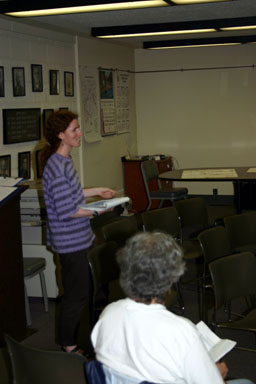
Environmental Planner Debbie Gross discusses hazard mitigation with the Town Board
The letter noted that the Town and Villages had cooperated on the earlier plan, which is focused on preventing disasters, and asked for suggestions for new participants. The fire companies were added to the list of prospects. Gross also suggested that the plan include an implementation plan.
Gross presented two plans for a kiosk along the Jim Schug Trail. After some discussion of positioning the kiosk to reduce vandalism, the board opted for the cheaper of the two plans.
Gross also distributed a flier on Phase II stormwater control issues (317KB PDF) to board members and read a message from Planning Board member David Weinstein remembering volunteer Jarrett McLaughlin, who was killed in an automobile accident in Newfield recently.
Councilman Michael Hattery also wanted to know about the status of the Draft Comprehensive Plan, asking Gross, "Is that ready to be handed over to us?"
Gross reported on the "agricultural community's... concerns about the zoning that could come out of the plan" and noted the offer by Craig Schutt, Chair of the Conservation Board to work toward a solution. She said the goal "is to move it forward as quickly as possible".
Hattery replied that "I'm concerned that... the proposed Comprehensive Plan will require changes in the zoning ordinances to be compatible with it... I'd like to get communication going. If the proposals in the Comprehensive Plan are things that we're not going to want to make changes... to some degree we need to get communications going, I don't want them spinning their wheels."
Gross offered to get the board recent copies of the changes to the plan, and pointed out that the plan doesn't include an implementation plan, something she might want to draft notes for. The board also asked if the Town was still paying consultant George Frantz additional money on the project, which has been going since 1998. No one seemed to know. Councilman Christofferson noted that implementation is going to take a while as well. Gross offered to act as a liaison between the boards. Christofferson said he could as well, and said "it's got to get wrapped up... something's got to get to us to take a look at to get some feedback to you guys."
Gross suggested the board start looking at the last draft, saying that changes so far were "pretty minor."
July 13, 2004
Half-timbered house, Fahrenheit 9/11
This morning's Ithaca Journal brings a story of a house on German Cross Road being built of timber, clay, and straw. The foot-thick walls are as insulated as walls using typical 6-inch fiberglass batts. The materials are all local, and the design is old, as "half-timbered houses from the 12th century still exist in Europe." They'll be having another work party July 17th and 18th.
The Journal also runs a piece collecting local opinions of Fahrenheit 9/11. Joan Stock of Dryden is among the people quoted, saying "Although I haven't seen his latest film, 'Fahrenheit 9/11,' I have seen his other productions. They are humorous, I give him that. But he mixes fact and fiction with what he, in his reality, believes to be true."
July 14, 2004
Farm walk, abuse charges, more
If you read this in the next hour, you have time to get to a dairy walk at 9am this morning exploring how Lewie and Steve Stuttle "have successfully combined pasturing with high milk production on their farm in Dryden." In the same set of briefs, the Ithaca Journal reports that the Conservation Board is looking for a new member.
A Dryden resident, Chris Slater, appeared in Town Court facing two new counts of first-degree sexual abuse after a conviction in 2002.
The Journal also has an announcement for the upcoming 4-H Youth Fair, which will be held July 28th to 31st at 4-H acres (map).
On the opinion page, Nari and Virgina Mistry write that "Kerry and Edwards will provide better healthcare, jobs, education and taxes balanced against ballooning deficits, and will protect the nation's future without the 'compassionate conservatism' that only shows contempt for us ordinary Americans. For foreign policy wisdom they can learn from the grievous mistakes of the last four years."
In the print edition only, there's a table on educational attainment by residents of the Village of Freeville age 25 or older, which is very similar to the "Percent of Population 25 or older" section of this census table.
July 15, 2004
School budgets, boards, lots of small news items
The Ithaca Journal has lots of news stories on Dryden today, though Dryden plays only a small part in many of them.
On the schools front, Tricia Edgecomb is resigning from the Dryden school board a year into her term. Dryden's 1979 High School Class Reunion will be July 17th at 4:30pm.There's also a piece on prospects for resolution of state education funding issues.
In the Ithaca district, researchers are examining the special education program and Ithaca High School will no longer give Kente stoles to members of the African Latino at graducation.
Gail Park, Director of Southworth Library, is one of several county residents quoted in interviews about the economy under President Bush.
The Journal has a huge list of police reports, actually split into two stories. Some are old, and some are undated, but a lot of them seem to come from the last week. The only one in Dryden involves unpleasant vandalism at the Covenant Love Church on Route 13.
There's an article on the Town of Lansing's recreation program including a quote from Dryden Recreation Coordinator Jennifer Glaab saying "We're still up and growing in Dryden. They have a great model that we strive for." It also discusses Lansing's not participating in the Recreation Partnership.
There's a piece on the Town of Ithaca's efforts to create bike paths that aren't right on the road, which reminds me of the opportunities here to do more with the old railroad beds from Varna to Freeville and Freeville to Dryden. Walking or riding along 366 isn't much fun, and there's a path already graded that could be much more pleasant if developed.
On the opinion page, Ken Jupiter of Dryden writes about bunkers for firefighters in Ithaca, and the Journal's own editorial discusses the the unclear status of the TCAT bus system and hopes for a solution.
Dryden Democrats choose Valentinelli for Town Justice
Meeting at Etna's Houtz Hall on Tuesday night, a Democratic caucus unanimously selected Joseph Valentinelli, the incumbent Town Justice, to run again as their candidate this November. County Legislator Mike Lane spoke glowingly about Judge Valentinelli's fairness and passion for the job.
Valentinelli taught at Dryden Central School for 37 years and is completing his second term as Town Justice. He was previously a Justice for the Village of Dryden before the Town and Village consolidated their courts.
He is one of two judges in the Town of Dryden Court. Justice Christopher Clausson is not up for re-election this year, having been re-elected last year. The election will be in November, the only town position on the ballot.
Flags not included
It's a big year for politics, and signs have been in yards for months. I have a stack of Kerry signs in my basement, but there are other choices as well. Here's a roundup of where to get signs related to the 2004 presidential race. (As New York seems a very safely Democratic state this year, the national campaigns are apparently not sending resources, like free signs, here.)
If you'd like a John Kerry for President sign, waterproof with a wire frame, you can call me, Simon St.Laurent, at 256-5334, and pick it up at 1259 Dryden Road. These signs were purchased from Kerrygear.com by the Town of Dryden Democratic Committee, and we're asking for a donation of $5 per sign.
If you'd like a Bush-Cheney sign, call Mark Finkelstein, the Tompkins County Republican Committee Chairman, at 277-2743. They're also asking for a $5 donation, and the signs are at the Gun Hill Residences office, 210 Lake St., Ithaca. (Thanks to Duane Testut for leaving that information here.)
If you'd like a Bush Must Go sign, their headquarters is at 115 The Commons, Ithaca, above Autumn Leaves bookstore. They're looking for a donation of $6 per sign and $1.50 per bumper sticker. As you can see in the picture above, they left a space for people to add their own messages to the sign, and have a selection of stickers available for that.
(It should be obvious, but my inclusion of sign-providers in this list does not mean that I endorse their efforts, except of course for my own efforts.)
July 16, 2004
Congressional race shaping up
This morning's Ithaca Journal has two articles on the race for Congress in the 24th District. Democrat Brian Goodell of Lansing has left the race and endorsed Jeff Miller of New Hartford. Meanwhile, Republican incumbent Sherwood Boehlert has raised a million dollars as he battles David Walrath, who has filed to run against him in the primary and on the Conservative line.
(You can visit Bohlert's web site and Walrath's web site.)
The Journal also posts the TC3 Dean's List today.
The Ithaca Journal is going to take more advantage of its web site to publish more reader letters, going beyond the space available on the editorial page. They still won't print everything:
"Will every letter submitted make it into the standard or Web version of The Journal? Unfortunately, no. Each letter appearing on the Web also must be read, edited, verified and published, just as print versions are. That effort takes staff time. If this newspaper were to publish all suitable letters, it would need an fleet of new editors to process them."
It sounds like an interesting compromise, something to watch.
Tower, serendipity, making a difference
This week's Dryden Courier looks at the protracted saga of the Crown Castle Atlantic cell phone tower that the Town Board approved last week. They also visit the Dryden Historical Society, looking through the collections and talking about the programs. Inside, they examine grants made by the Dryden Youth Opportunity Fund and a challenge faced by Dryden High School students at a science competition at Alfred University. (The Dryden students took first place.)
I actually wrote the Guest Opinion this week. They titled it "A Single Voice Can Make a Difference," and you can read it here.
July 17, 2004
Teachers' contract negotiations, stream monitoring
This morning's Ithaca Journal reports that there may be hope for Dryden's stalled teacher's contract negotiations, as new Superintendent Mark Crawford sets up informal meetings and the personnel involved shift.
There was a brief mention of a Six Mile Creek volunteer water quality monitoring workshop this morning at Bethel Grove. It's too late to go now, but I took some pictures and I'll be posting a story soon.
At the county level, a mortgage tax proposal has come up for the second time this year, and will be voted on Tuesday.
On the Opinion page, there's a big Laurel from W. Mark Sutton of Dryden to businesses in and around Dryden for helping him raise $5,227 in funds for lung research.
Narrowing an intersection
When I last reported on the intersection of Ellis Hollow Creek and Genung Roads, the town was experimenting with a temporary barrier to narrow the turn from westbound Ellis Hollow Creek on to Genung. It looks like the experiment was a success, as they've moved to more permanent measures.
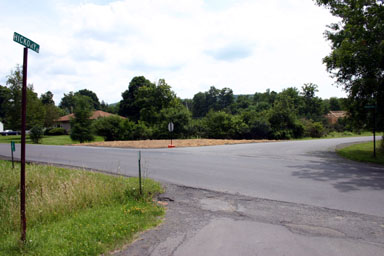
Ellis Hollow Creek and Genung Roads, from Hickory Road.
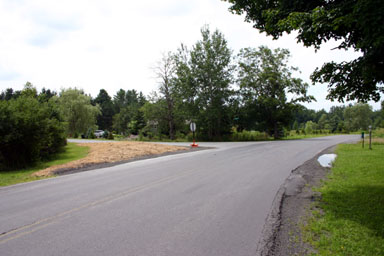
Ellis Hollow Creek and Genung Roads, from Ellis Hollow Creek Road.
July 18, 2004
Six Mile Creek Monitoring training
Yesterday morning I enjoyed a workshop for volunteers preparing to monitor Six Mile Creek. They've had several previous sessions and meetings. This one was about "Sample Collection, Chemical Analysis, and Flow." It started at the Bethel Grove Community Center (actually in the playground, as an aerobics class was in the building) and then moved to the bridge on German Cross Road that crosses Six Mile Creek.
There were two complementary aspects to the training: chemistry and geology. Dr. Steve Penningroth of the Community Science Institute explained the chemistry end of things, collecting water samples and testing them to see what's in the water.
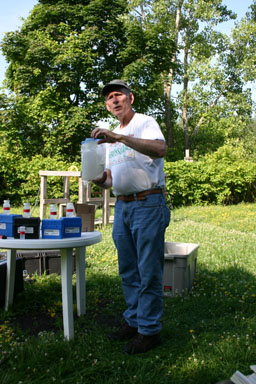
Steve Penningroth shows volunteers collection bottles.
Volunteers will be collecting water from the stream and recording the water temperature. The water can be tested for pH, conductivity, alkalinity (a measure of buffering capacity that isn't just the inverse of pH), hardness, chloride, turbidity, solids, suspended solids, soluble phosphorous, total phosphorous, nitrates, nitrogen, dissolved oxygen, and coliform bacteria. The handout (966 KB PDF) Penningroth provided contains much more detail, including examples of measurements at times of high and low water.
Dr. Dan Karig, Professor Emeritus of Earth and Atmospheric Sciences at Cornell, explained the geological aspects of monitoring, focusing on determining the amount of water flowing down a stream at any given time and how those flows changed the stream and its surroundings. Again, the handout (391KB PDF) has a lot more detail about how this is done.

Dan Karig shows a chart of the depth of Six Mile Creek measured at the German Cross Road bridge.
Karig explained that Six Mile Creek is "strongly degrading" - meaning that the creek was cutting into its banks, not that it was full of toxins. The creek is still adjusting from the changes over the past to centuries from forest to agriculture and back again, and hasn't reached an equilibrium. 25,000 cubic yards of sediment currently flow down the creek annually, and land in the City of Ithaca's reservoir system.
After the broad introduction, the class moved to the creek itself to learn about the tests and how to conduct them. Karig demonstrated how to collect data for a stream cross-section and then collect information about the water velocity using a missile-like device.

Lowering the velocity tester into Six Mile Creek at the German Cross Road bridge.
Karig also demonstrated a device for collecting water to to determine its sediment content. This heavy device is lowered into the main channel and lowered and raised through the depth. Once brought to the surface, its contents can be analyzed to determine how much sediment is in the water.
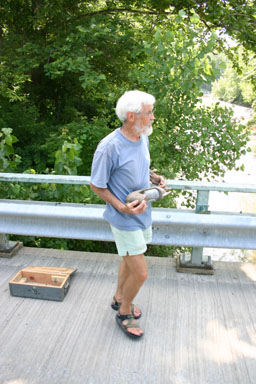
A suspended sediment tester for collecting samples in the creek.
After working with sampling techniques from the bridge, the group went down to the creek to collect samples and work with the test kits.

A volunteer gathers water samples in Six Mile Creek.
Once the samples were gathered, Dr. Penningroth showed the group pH testing with a (misbehaving) electronic meter, and then walked them through tests for dissolved oxygen and alkalinity. (The group may or may not use the test kits, which both take a lot of time and have a substantial margin of error, as CSI has a testing lab located here, at Langmuir Lab on Brown Road near the airport.)
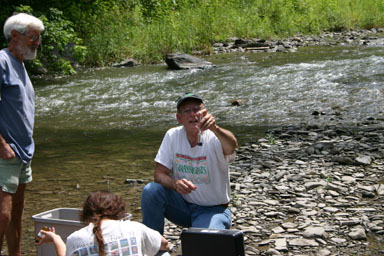
Dr. Penningroth titrates a sample to determine its alkalinity
The volunteers stayed interested, and had plenty of questions. Two people from the Tompkins County Soil & Water Conservation District were also there: Craig Schutt, District Manager, and Gordie Morgan, Conservation Technician. (Schutt is also the Acting Chair of the Town of Dryden Conservation Board, and Karig is a member.)
If you'd like to see more of this event, I've put up my pictures as a gallery.
Green construction in Bethel Grove
Yesterday was a busy day in Bethel Grove. First I went to the stream monitoring workshop, and then I stopped by the workday for Sarah Highland and Cat Berry's clay-straw house that the Journal had mentioned earlier this week.
I arrived at lunch, so the pictures aren't really action shots, but you can see the house developing. The north wall has lath for extra support - Highland said it was a lighter mix that would be warmer and dry faster.
The rest of the house will be made with the mixture poured into forms on the wall. The forms are then removed after the mix forms a solid brick.
They're using two mixers - one to produce the clay slip, and then another to mix that slip with the straw.

The mixer for the clay and straw.
The house is a timberframe, erected last year. The walls are going up this summer, and then they'll be plastering the inside. The outside will get a light coat of plaster and then eventually wood siding.
I asked Sarah Highland about the clay-straw approach, and while it is labor-intensive, she felt it was a better idea for this climate than strawbale construction, which builds houses out of bales of straw which are then coated with plaster. The clay is hygroscopic, so it draws water out of the straw and the timbers, reducing moisture problems for both materials. Though it looks like a construction site with bales of straw piled up, it looks like the house is being built to last.
July 19, 2004
Fishing, opinions
This morning's Ithaca Journal has a picture of nine-year-old Brandon Elia fishing at Dryden Lake as part of the Wal-Mart Kids All American Fishing Derby that was held Saturday.
The State Police seem to have been busy along Dryden's borders, making DWI arrests on 34B and 13.
The opinion page carries two letters that are very similar to letters published in the Dryden Courier earlier this month. Gabriel and Penelope Carpenter of Dryden suggest that "We are on the verge of bringing to fulfillment Huxley's 'Brave New World,' in which the family is irrelevant, parents do not exist, and the purpose of human life is to achieve a blind euphoria, no matter the cost."
Laurie Fitzgibbons of Freeville asks "Why is a man, who has never been a superintendent of schools anywhere, being paid more than a woman who had been a superintendent for 13 years, 5 of them in Dryden?"
Where do you walk?
At last week's Planning Board meeting, Jim Crawford asked a lot of questions about sidewalks, especially around the hamlet areas. Sidewalks are a regular request for Varna, though apparently not as in demand in Etna.
I walk around a lot on my property - sitting still is difficult for me - but I don't walk from place to place very often. I occasionally walk up to the Plantation Inn, and I've walked to Treeforms and the Exxon on the corner a few times, but generally if I'm going somewhere I drive. That's the nature of where I live, and it's the nature of a lot of Dryden. I have a lot more walkable destinations than much of Dryden does, in fact. Better shoulders to walk on, too, though they're not exactly comforting.
Sitting and driving aren't great exercise. I've always thought driving to the gym was just bizarre. Bicycling is an option, though I count regular riders on 366 as brave. I do walk around the Village of Dryden a fair amount when I'm there for any length of time, but that's probably once a week.
July 20, 2004
TC3 advocate dies, county and state issues
This morning's Ithaca Journal reports on the sudden death of Rere Hassett, a professor at TC3 and head of the Public Assistance Comprehensive Employment (PACE) program there.
They also report that senior coupon booklets for the Farmers' Market will be available at the Dryden Food Pantry, at the Dryden Presbyterian Church (map), from 11am to noon on Friday the 23rd.
In county news, County Legislator Mike Lane is quoted about an August public meeting on the county executive proposal. The Government Operations Committee has visited Chatauqua and Chemung counties, and will probably be visiting Broome County as well.
Ray Schweiger of Dryden, "a police officer in [Ithaca] for more than 14 years," is quoted supporting John Beau Saul in a report on responses to the Ithaca Journal's asking who should be next police chief in Ithaca.
A guest column from County Legislative Chair Tim Joseph discusses the conflict with the state over the county jail and Joseph's hopes for avoiding a court battle.
The Journal's own editorial looks to a vote today at the state level, urging readers to call their state senators to support an increase in the state's minimum wage.
Thursday night Town Board meeting
The agenda for Thursday night's Town Board meeting, complete with five public hearings, is now available. This will be the first time this year that the Board has two business meetings in a month. The meeting will be at 7:00pm at the Dryden Town Hall (map).
July 21, 2004
Principal, roads, 2-for-1 cats
Wednesdays are often busy Dryden days in the Ithaca Journal, but today's issue is overflowing.
Doug Premo, Dryden Intermediate School Principal for grades three through five, is leaving for a job in Ballston Spa after fifteen months in Dryden. He'll be departing July 30th, and the board is looking for an interim principal and a replacement.
In happier news, the Highway Department is maintaining its summer schedule despite changes and wet weather. There's some discussion of Hunt Hill and Genung Roads, where the current situation - patches that held up well - seems to be all right.
Cathy Wakeman's Dryden Town Talk brings a thank you to the community and volunteers from the Dryden Kitchen Cupboard, which provides emergency food to an average of 140 families a month. Wakeman also notes that the Seven Valley Chorus of Sweet Adelines International will be having a concert at 6:30 pm tonight at Montgomery Park in the Village of Dryden.
The SPCA has a buy-one-get-one cat sale going on; normally cats are $53, but right now you can get two for $60, complete "with cat carriers, pet food, engraved identification tags, a booklet on cat care, discounts at pet supply stores and a free veterinary visit.".
The Dryden Conservation Board is looking for a new member, and "is especially interested in finding a representative from the farming community."
In county news, the legislature voted down a mortgage tax 8-6, with County Legislator Mike Lane opposing it, saying, "I still feel it unfairly impacts the low and moderate income home buyer. This resolution is unworkable. It's rushed through."
The county is considering an income tax, setting up a study group. Raising money for local government through income rather than property taxes came up recently at a Planning Board meeting where farmers were expressing their concerns. If it's doable (a big question in itself), shifting tax collection from property to income might go a long way toward taking pressures off farmers. (It seems even more unlikely that schools would go the same route, however.)
On the opinion page, a Q & A with the Finger Lakes Land Trust mentions that "Ellis Hollow Preserve features a trail system through mature hardwood forests."
Freeville Summer Rec
This week's edition of The Shopper includes an ad for the Village of Freeville's Summer Rec Program, which is running July 12th to 16th, 19th to 23rd, 26th to 30th, and August 2nd to 6th and 9th to 13th. (That's Mondays through Fridays from July 12th to August 13th.) The program runs from 9am to 3pm at the Freeville Elementary School. The cost is $30 per week and scholarships are available.
Royal Road water and sewer
One of the public hearings tomorrow night will address the creation of water and sewer districts for the Royal Road area, off Hanshaw Road near Route 13. If you're curious what's involved, I've posted the engineering reports for both:
- Engineer's Report, Proposed Royal Road Water District (336KB PDF, or 476KB PDF with copyable text) and map (101KB PDF).
- Engineer's Report, Proposed Royal Road Sewer District (371KB PDF, or 521KB PDF with copyable text) and map (112KB PDF).
The board approved adding F & T as an out-of-district customer for the Hanshaw Road district at the last meeting, but it sounds like both the town and at least some of the participants would prefer a more comprehensive solution. The reports also give a good idea of what's involved in creating a new district, and are worth examining even if you're not interested in this particular area.
July 22, 2004
Jail questions, sign-stealing
After yesterday's burst of stories, today's a quiet day for Dryden in the Ithaca Journal. County Legislator Martha Robertson is quoted in a story on whether boarding in prisoners could help finance a larger jail, discussing the risks of the idea:
"If the only jail the commission will approve is 136 beds, and I think it is clear that is true, we could mitigate our expenses by expecting to board in prisoners. There is no way we need 136 beds for our people. But if we think there is a hot market for jail beds and we think we can house 30 people per night, it would make sense."
There's an article on Lansing discussing a drainage district that's interesting in part because Dryden doesn't have any drainage districts. Regulations for stormwater management have come up on a regular basis at Town Board and Planning Board meetings, so I wonder if this is something we may see here eventually.
In letters, Charlie Hart of Freeville (not Charlie Hart of Dryden) writes that the recent pile of letters complaining to the Journal about sign-stealing are tied to tolerance for civil disobedience here - "another criminal act in a liberal town."
Sign-stealing is obnoxious, but it's strange to see it used as a political bludgeon, especially when signs of all varieties have been reported stolen. Perhaps it's the result of a general decline in civilization, but it seems a lot more likely that it happens more frequently when political campaigns run from January to November instead of starting after Labor Day.
Recreation partnership information
One of the items on the agenda for tonight's Town Board meeting is "Recreation Partnership: Presentation and Questions - Nancy Zahler & Liz Vance". The recreation report from the July 8th meeting included information on the partnership, including:
- Registration data by town and city (112KB PDF). (Dryden is the fourth column from the left.)
- Recreation Partnership agreement (534KB PDF, or 728KB PDF with copyable text.)
- Recreation Partnership by-laws (196KB PDF, or 272KB PDF with copyable text.)
Recreation Coordinator Jennifer Glaab also included this Ithaca Journal article on the Town of Ithaca's considerations on the Recreation Partnership.
(I will be getting to covering the recreation report in more detail, but if you're impatient, I've posted the rest of the written report 354KB PDF, or 463KB PDF with copyable text.)
July 23, 2004
Brong pleads guilty; new SPCA leader
The Ithaca Journal reports that former Town of Dryden bookkeeper Liva Brong pleaded guilty to fourth-degree grand larceny for depositing an $8,993.42 forged check. The Town is still reviewing its books for last year. Brong will be sentenced October 22nd, and the recommended sentence is $701 for restitution and five years of probation.
The SPCA has chosen Cornell ethics professor James Tantillo as a temporary replacement for departing Executive Director Nathan Winograd. The SPCA also has emergency preparedness for animals brochures, with one for pets and one for large animals. The brochures were produced with a hazard mitigation grant.
County Legislator Martha Robertson is quoted about the buying process in an article on the county's purchase of a new emergency communications network, which should be running by the end of July, 2006.
Dryden school planning, "Headstone Controversy"
This week's Dryden Courier takes a look at the Dryden Central School District's formation of a strategic planning committee to "map out district goals for the next five years," as well as the board's reorganization at its first meeting of the newly elected board. The Courier also notes Patricia Edgecomb's departure from the board.
There's also a piece on a set of headstones that were moved from Carpenter's Cemetery, near Creamery Road in Harford, to the Pioneer Cemetery in the Village of Dryden. The stones were moved there during the 1968 clean-up of the Pioneer Cemetery, and it looks likely that they'll be moved back this year, after investigation of some insurance issues.
Town Board has five public hearings
At last night's Town Board meeting, the board heard five different public hearings, as well as two points of citizen's privilege. (The Recreation Partnership discussion was apparently postponed.)
The first hearing was on an application by Andrew and Elaine Morenus for a special permit to operate a home appliance and furniture rental business, Home Necessities, at 234 Johnson Road (map). Andrew Morenus described the facility as a distribution hub for their five stores, as well as a headquarters. Truck traffic, which came up as an issue throughout the meeting, would be minimal. The county disapproved of the application, finding that the use didn't meet the definition of a material yard, but Zoning Officer Henry Slater felt it did fit, and cited an application for much more intensive use by United Asphalt on the same property a few years ago that the county had approved. County disapproval meant that the board would need at least four votes to approve the permit. After the public hearings were closed, the board approved this permit 5-0.
The second hearing was also for a special use permit, for Raymond Oliver and William Tripp's application to put a mulch and coal storage yard at 215 Groton Road (map). The business would be on a former gas station. All the tanks and toxins have been removed from the soil, but people have been using it as a dump for a while. There were a lot of questions about the maps provided, and about empty storage containers that would apparently have been stored there for Oliver's "You call it, we haul it" refuse removal business. It wasn't clear that Oliver would actually be an applicant. After the hearings, the board voted to continue this hearing to a future meeting to get these questions answered.
The third hearing was a site plan review for Ralph Crandall's proposal for a self-storage facility at 1410 Dryden Road (map). Crandall currently operates Locke Woods Interiors and a car dealership on an adjoining site. There was a lot of concern about the possibility of garage sales on the site, which Crandall was willing to drop, but in the end the board continued the hearing to find out more about the proposed design of the building.
The hearing which drew the largest audience was definitely the special use permit hearing for Ithaca Produce's proposed move to 226 Johnson Road (map) from 2025 Dryden Road (map). The move is both an expansion and an effort to put the business and its truck traffic far away from neighbors.

Richard Cutia, Jr., discusses truck traffic with the Town Board
Residents of Johnson Road as well as Freeville's Mayor and Chair of the Planning Board were there to ask questions about the project, particularly its traffic impacts. Ithaca Produce's expectation is that nearly all of its truck traffic, with the exception of a delivery truck going to Freeville Elementary School, will go to 13, and accepted that as a stipulation. There were also some concerns about appearance, though the building will be 500 feet from the road. Ithaca Produce agreed to landscape that screens the building from the road. A neighbor across the street provided a letter supporting the project, and the board later passed the approval for the project.
The last set of public hearings addressed the creation of the Royal Road Water and Sewer Districts. Although no one appeared in person to oppose the project, Supervisor Trumbull read a letter from Ithaca Self-Storage's owners into the record complaining of the "disproportionate burden" they would have to pay on a district whose services they don't presently plan to use. In the end, the board approved the district, subject to permissive referendum.
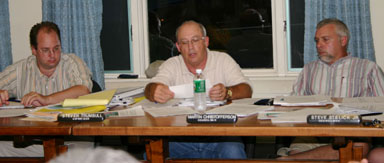
Supervisor Trumbull reads a letter from Ithaca Self-Storage into the record
There was also a question about connection fees for F & T Distributing, as the formula for out-of-district users would likely require them to pay more than $10,000 up front for water service they were using only until the Royal Road districts began operation. As F & T is already a user of the Monkey Run district at its current location, the board waived this fee.
At the end of the meeting, Councilman Michaels asked that the board have more complete SEQR and resolution proposals from the town staff to speed up the process of these approvals.
In addition to the public hearings and decisions about them, there were two points of citizens' privilege. Gilbert and Irma Levine of Brooktondale Road asked for a light post at the intersection of Route 79 and Brooktondale Road (map). County Legislator Martha Roberston noted that she had talked with Caroline Town Supervisor Don Barber about this, as Caroline was putting a lighting district in the area. Town Attorney Mahlon Perkins interrupted and said not to bring Don Barber into the discussion, urging that adding a light be done directly by the Highway Department. Supervisor Trumbull asked the Levines to return at a later meeting when the Highway Superintendent would be present.
Finally, Conservation Board Chair Craig Schutt talked to the board about the Conservation Board's discussions with the Planning Board and the agricultural community about the Draft Comprehensive Plan. Building on discussion from an earlier Planning Board meeting, Schutt suggested forming a group of the boards and agriculture community members to come up with language all sides could agree on for the Comprehensive Plan, and then continue to work toward implementation suggestions. Schutt invited the Town Board members to participate as well, and they seemed amenable to the idea.
Is New York State a democracy?
I know we have an elected government, but its connection to actual voters seems more and more tenuous every year, as power in the state concentrates in three officials, only one of whom is elected directly. It's not specific to Dryden, but it certainly affects us:
"From 1997 to 2001, the New York State Senate voted on 7,109 bills; not a single bill was voted down. From 1997 to 1999, the state Assembly voted on 4,365 bills; not a single bill was voted down."
Far more detail, and even suggestions for fixing this sorry state of affairs, is here (405KB PDF) in a report from NYU Law School's Brennan Center of Justice. For one reasonably outraged (but perhaps still too calm) reaction to the report - and Senate Majority Leader Bruno's reaction that democratic process is "just chaotic, doesn't work... That's Third World country stuff" - see NYCO's blog.
(Assembly Speaker Sheldon Silver's response to the report, that "The rank-and-file representatives of the citizens of this state weigh in in the Assembly on a consistent, regular basis," is not particularly encouraging either, given that the "weighing in" seems to be done mostly in private.)
July 24, 2004
Democrats party for Kerry
County Legislator Martha Robertson held a "Party for Kerry" at her home Friday, raising money for the Kerry campagin in the last few days before the convention and the end of fundraising. (Once Kerry accepts public funding, the fundraising and spending based on that fundraising comes to an end.)
Robertson and State Democratic Committee representative Peter Stein talked about the campaign, the frustrations of being in a "safe" state while battles for other states are in progress, ways Democrats can help the national ticket, and prospects for local races this fall.
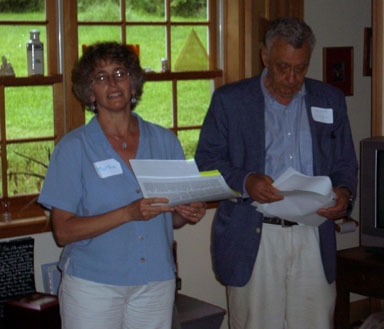
Martha Robertson and Peter Stein talk about Democratic prospects.
Dryden seems very politically awake this election year. Signs are up, people are active, and it's only July.
July 25, 2004
Catching up with yesterday's Journal
It's a good thing I put up a late-night post that produced an entry for yesterday, as I left at 6:30am for Ottawa, Ontario, to pick up a friend, and wound up returning home after midnight, after my wife drove to Utica to get us in a car loaned by generous friends.
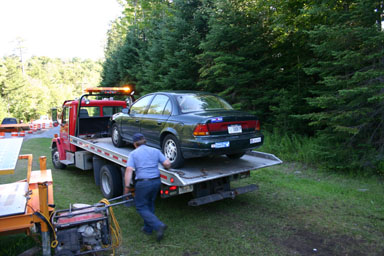
My car on a tow truck, near Inlet, NY
The car is now in Utica, so it may be light here tomorrow while I sort that out.
Anyway, the Ithaca Journal did have some articles about Dryden-related issues while I was wondering how to get home. The biggest of them was an article on Thursday night's many public hearings. There's also a picture of Tompkins County Highway crews repairing culverts on Sheldon Road Friday.
In government activity near Dryden, the New York State Department of Transportation will be conducting a study of the Route 13-Brown Road intersection, the first intersection on Route 13 west of the Dryden town line.
There's a brief on the 4-H Fair next week, which includes a pointer to the schedule.
In Religion Briefs, there's a notice that the Etna Community Church is preparing to celebrate its 200th aniversary on September 19th.
In Darts & Laurels, there's a laurel from Doreen Barker of Brooktondale, to a number of businesses and organizations including the Dryden Recreation Department for their work in organizing and supporting the July 17th fishing derby on Dryden Lake. There's also a laurel from the American Red Cross, the Varna Community Association, Mike Raffe and Lauren Signer to participants in the June 25th blood drive at the Varna Community Center. (This seems to be the same as a Laurel published July 10th. Also, the paper's site doesn't include the letters printed in Saturday's paper, but none of them are from Dryden writers.)
July 26, 2004
Quiet day in the Journal
There's very little Dryden news in the Ithaca Journal today - just a notice for the 4-H Youth Fair, which runs from Wednesday July 28th to Saturday July 31st.
July 27, 2004
And another quiet day in the Journal
Either Dryden is very peaceful lately, or the Journal is saving up time-insensitive Dryden news for tomorrow's Our Towns section.
In county news, there's a piece on the new 911 center by the airport in Dryden. The editorial looks at the growing pile of New York State debt.
July 28, 2004
Golf course volunteers recognized
This morning's Ithaca Journal has an article on the volunteers keeping the Lakeview Golf Course going. Town Supervisor Steve Trumbull appreciates their efforts:
"Those members who are donating time, fully free, mowing the course, mowing the greens, donating money for gas -- those guys are unsung heroes."
Trumbull notes that the town's preference is for a private buyer to purchase the course and keep it as a golf course, rather than taking advantage of the current residential zoning for the site. (The board seems uninterested in changing the zoning.)
Dryden briefs mention the 4-H Fair that starts today, as well as the Dryden Conservation Board's continuing search for a new member.
In the 24th District congressional race, David Walrath has received the Conservative Party endorsement, ensuring he'll be on the ballot in November even if he loses the Republican primary to incumbent Sherwood Boehlert.
If you're curious about how much rain we've had in July, we're not quite in the record books yet. Last July is still ahead of this July. The record is 9 inches in 1935's major flooding, while this year we're at 6.04 inches.
July 29, 2004
School summer program
There isn't much in today's Journal about Dryden, but what there is seems bright: a piece on how Dryden Elementary School managed to keep a summer program going on a much smaller budget than before.
The Journal's editorial is on ten possible targets for taxation. It's plainly a joke, but it strikes me as sad that half of their suggestions (3, 5, 8, 9, 10) are veiled complaints about public participation in political processes. The Journal always seems surprised when people aren't willing to participate the way it sounds like they'd like them to participate - quietly, by themselves, at the voting booth and by mail.
July 30, 2004
4-H fair; assault at George Jr.
Today's Ithaca Journal has pictures of the 4-H Fair in progress on Lower Creek Road.
The Monitor includes news of an assault on a George Jr. Republic employee as well as a DWI.
There's also a notice of a poker run Saturday benefitting Tanner Solveson.
Irene Scott of Dryden writes to complain that the Journal's coverage of the Democratic Convention's impact on Boston hasn't been as critical as its coverage of the Republican Convention's impact on New York will be.
In state news, much to my disappointment, Governor Pataki burnished his conservative credentials by vetoing an increase in the state minimum wage that the Republican Senate passed 51-7 and the Democratic Assembly 116-19. Our local Assemblywoman, Barbara Lifton, says in the article that "I'd hate to think that George Pataki thinks more about his national image than about New York state and the effects of his actions on the people."
In the usual three-person style of New York State government, the question of whether New York's minimum wage will increase is on Senator Bruno's shoulders. Hopefully he won't quietly duck away with a fabricated procedural maneuver.
July 31, 2004
Generator poisons contractors; opinions
Emergency crews responded to a carbon-monoxide poisoning incident in Dryden yesterday after two men were overcome by fumes in a basement where they had set up a generator.
On the opinion page, John and Marlene Nardi of Freeville send a Laurel to Danby American Legion Post 221 and everyone involved in a July 24th benefit. Dorothy Manley worries that opponents of gay marriage aren't showing backbone while "so many manage to stand strong against the president and his agenda."
Construction along Dryden Road
There's a lot going on along the overlap of Routes 13 and 366 lately. I'd mentioned the Town Board giving approval to Marrotte to put up a two-car garage, and that's largely up now.

The Marrotte garage under construction
Down the road at BB Farms, they're adding a more permanent barn-like structure to their current temporary stands.
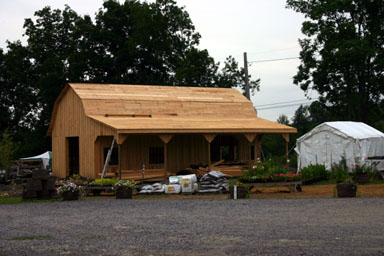
The BB Farms barn under construction
There's also a house that's been under construction there for a long time, but I haven't seen progress in over a year. I was very happy to see it when it got started, but don't know what to make of this long pause.
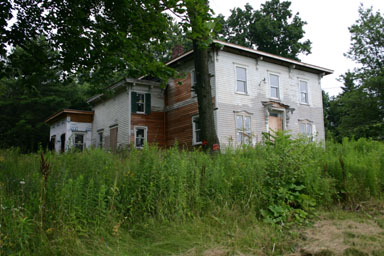
1477 Dryden Road, where construction seems to have paused.
Down the road toward Ithaca, on 366, Saunders' Greenhouse has a new coat of paint, leaving behind its previous green.
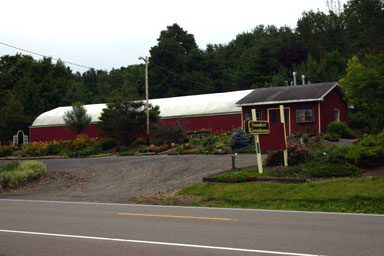
Saunders Greenhouse, now in maroon paint.
(Saunders' neighbor, the Plantation Inn, also got a fresh coat of paint recently.)

